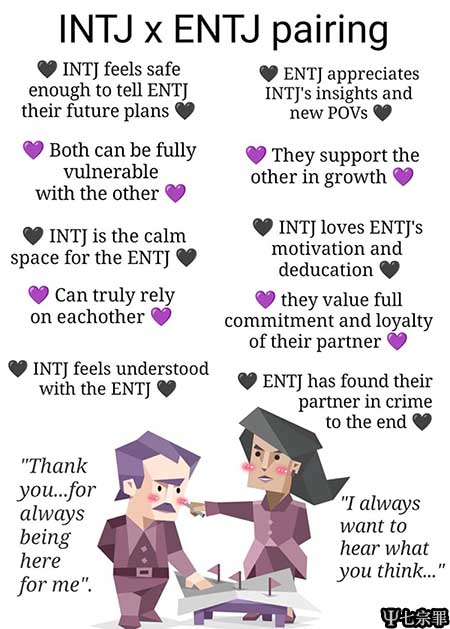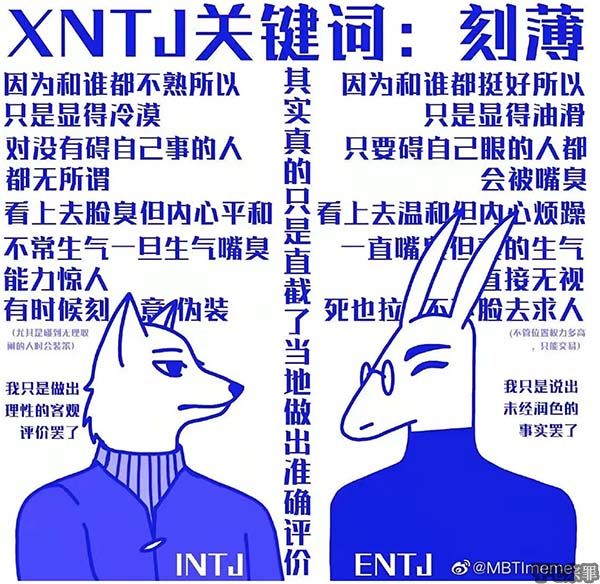Overview of ENFPs’ Functional Stack & Type Development
ENFP的功能类型和人格发展
ENFPs’ functional stack:
ENFP的功能类型:
Dominant: Extraverted Intuition (Ne)——主导功能:外向直觉(Ne)
Auxiliary: Introverted Feeling (Fi)——辅助功能:内向情感 (Fi)
Tertiary: Extraverted Thinking (Te)——第三功能:外向思考(Te)
Inferior: Introverted Sensing (Si)——第四功能:内向感觉(Si)
Their type development can be roughly divided into three phases. These phases unfold in accordance with the differentiation and development of their functional stack.
Phase I: Expanding & Experimenting

阶段一:拓展和实验
While ENFPs tend to remain curious throughout their lives, this is especially pronounced early in their development. As mentioned above, they tend to be equally open to both actions and ideas, to trying just about anything once. ENFPs expand their horizons by any number of means: reading, travel, the arts, taking classes, engaging with people, etc. This exploratory phase often continues well into their twenties, even into their thirties.
ENFPs对世界的好奇心会可能持续他们的一生,但在这个阶段却发展得尤其显著。就如前面提到过的,ENFPs倾向于平等地接受各种各样的行为和理念,希望能尝试所有的事情。
ENFPs通过很多方法去拓展他们的视野:阅读、旅游、艺术、上课、与他人交流等。这个探索的阶段通常会持续到他们的20s,甚至持续到30s。
Phase II: Clarifying Values & Interests
阶段二:澄清价值和兴趣
As ENFPs develop their auxiliary function, Introverted Feeling (Fi), they feel compelled to refine and clarify their values, worldview, and identity. The process of “finding themselves” entails both inner (Fi) and outer (Ne) exploration. In this phase of development, ENFPs may seem more serious, focused, and morally directed than in their younger years.
当ENFPs在发展他们的辅助功能—内向情感 (Fi)时,他们会感觉到想要改进和澄清他们的价值观、世界观和人生观。
这个“自我发现”的过程既需要内向的Fi功能,也需要外向的Ne功能。在这个阶段,ENFPs往往会看上去比年轻时更严肃、更专注、更有道德感。
Phase III: Convergence & Introversion
阶段三:内向整合
If and when ENFPs enter Phase III, they develop and integrate their tertiary (Te) and inferior (Si) functions. As ENFPs develop their Te and Si, they become more committed and self-disciplined. They balance their Ne propensity for restless seeking with Te/Si commitment and steadfastness. They learn to calm their restless minds and be okay with “what is.” They become more inner- directed and self-aware, moving toward inner harmony of mind, body, and spirit.
当ENFPs进入到第三阶段,他们会开始发展和整合他们第三功能Te和第四功能Si。随着ENFPs逐渐发展起Te和Si功能,他们会变得更加信守承诺、更加有自制力。他们会逐渐在“不知疲倦地探索(Ne)”和“确信而坚决的(Te/Si)”中找到某种平衡点。
他们学会去平复他们不知疲倦的跳跃思维,学会去接受“这就是什么”的认知设定。他们变得越来越内向驱动、越来越有自我意识,会朝着内心的和谐、身心的统一而前行。
ENFPs’ Dominant Function: Extraverted Intuition (Ne)
ENFPs的主导功能:外向直觉(Ne)
Extraverted Intuition (Ne) is ENFPs’ dominant function. It can function either perceptively or expressively. The verbal expression of Ne amounts to something like “thinking out loud.” When orating, ENFPs may not always seem to “have a point” as they randomly move from one idea to the next. Often times, the “point” is for the ENFP to find their way to a judgment (Fi), but this first requires them to explore multiple options by way of their Ne. While others may not trust the seemingly arbitrary and haphazard ways of Ne, ENFPs realize its value. They know that, in time, that truth or wisdom will reveal itself. Their only job is to talk, write, or otherwise express their Ne, trusting that it will lead them in the right direction.
外向直觉(Ne)是ENFPs的主导功能,它表现为“极具洞察力的”和“富有表现力的”。Ne功能的字面意思似乎就是“大声地说出脑海里的话”,在表达时,ENFPs似乎永远都不是专注于一个观点,因为他们的思维模式就是随机地从一个想法跳跃到另一个想法。
通常情况下,对于ENFPs来说,要形成一个“观点”需要依赖于他们的判断功能Fi,但在判断之前,ENFPs需要先通过他们的Ne功能去探索清楚各种各样的选项和可能性。
当别的人格型都并不怎么信赖这种有些武断和杂乱的Ne功能时,ENFPs却非常认可Ne的价值,他们觉得真理和智慧总会出现的,而他们所要做的就是去交流、去写作、或者做任何可以表达他们Ne想法的事情,他们坚信这就会引导他们走向正确的方向。
This helps us recognize a primary difference between ENP and INJ types. While both are dominant Intuitives, INJs have a stronger sense that they know something upfront. There is a certain confidence associated with their Introverted Intuition (Ni), which only increases when their Ni is expressed outwardly through their Judging function (Te or Fe). By that point, the point of extraversion, the INJ almost sounds certain in his or her pronouncements.
这一点帮助我们来区分ENP和INJ之间最大的区别,尽管他们的主导功能都是直觉,但INJs通常对事物有着强烈而直接的感受,INJs对他们的内向直觉Ni功能有一种明确的自信感,当他们将Ni直觉通过判断功能(Te or Fe)表达出来时,会进一步增强这种确信度。正因如此,INJs表达时通常听起来都是无比肯定的。
ENPs, by contrast, while sometimes having a initial hunch, do not experience the same sense of confidence prior to expression. When operating in Ne mode, they are often searching for answers as they go along; they are extraverting what INJs’ Ni does inwardly. This is why ENPs are classified as Perceivers. They tend to extravert their Perceiving function (Ne) more than their Judging function (Te).
ENPs就刚好相反,当他们对事物有最初的直觉看法,却不能在表达时拥有相同程度的自信心。
当ENPs使用他们的Ne功能时,他们通常是边走边寻找答案,与INJs的Ni功能是从内心寻找答案不同,ENPs通常从外界寻找答案,这也是为什么ENPs被定义为“知觉者”。他们倾向于使用的外向功能是Ne(外向感知)而不是Te(外向判断)。
Granted, some ENPs are much more cogent and streamlined in their expressions than others. But much of it depends on the context of the conversation. In some instances, ENFPs call on their tertiary function, Extraverted Thinking (Te), which is not at all random, but direct and to the point.
当然,有些ENPs在表达上会比其他人看上去更直截了当、直戳重点,但这大多取决于谈话的内容本身。在某些情况下,ENFPs会调用它们的第三个功能外向思考(Te),这个功能通常不是随机式的(Ne),而是直接的、有指向性的。
In addition to its expressive role, Ne can also function receptively. ENFPs enjoy asking questions that allow them to gather information from other people. This makes them good facilitators of conversation, using their Ne to read people and generate probing questions that make for interesting dialogue. ENFPs often hone and apply this talent in careers such as journalism, counseling, and psychology.
除了表达功能之外,Ne功能也表现为“接受者”。ENFPs喜欢通过问别人问题来收集他们需要的信息,这使得他们成为很好的沟通交流者,用他们的Ne功能去理解别人、产生有意思的问题,从而制造有趣的交流和谈话。ENFPs通常会把这项功能用在他们天生擅长的职业领域,比如记者、辩护律师、心理咨询等。
In contrast to Extraverted Sensing (Se), Ne does not focus on overt information. Se is more straightforward, involving a direct apprehension of information through one or more of the senses. Ne is different in that it goes beyond or looks behind sense data. This allows ENFPs to discern otherwise hidden patterns, possibilities, and potentials. By way of their Ne, ENFPs make connections that other types readily miss.
不同于外向感觉(Se),Ne通常专注于那些隐藏的信息。Se就要更加直接,矛头直指向一个或多个表现明显的证据上,而Ne则更喜欢观察那些显现出来的特征背后的信息和联系,这让ENFPs更容易去发现隐藏的模式、可能性和发展潜力。
通过他们的Ne功能,ENFPs通常可以观察到那些其他人格型错过的信息和关联性。
Ne also confers an open-mindedness. It helps ENFPs see truth on both sides of an issue without forming unwarranted judgments or premature conclusions.
Ne也带着天生的“开放胸怀”,这帮助ENFPs在没有任何预设条件的情况下同时从正反两面去看待事物的真理。
ENFPs also use their Ne to sniff out intriguing possibilities. They commonly enjoy and assume the role of wanderer or seeker. Rarely do they know in advance exactly what they are seeking, which is partly why they find operating in Ne mode so exhilarating. Ne involves a sense of blind anticipation and expectation, of not knowing who or what will manifest next in their life journey.
ENFPs也用他们的Ne功能去发觉潜在的可能性,他们通常非常乐意担当“漂泊者”和“寻觅者”的角色。
尽管在寻找之前他们通常很少知道自己到底要找些什么,但这或许也是当他们开启Ne模式时会非常兴奋的原因之一。Ne功能对于并不确定的未来会代入一些空想和并不合理的期待。
For instance, if functioning in Ne mode, ENFPs might spontaneously embark on a walk in unfamiliar city, anticipating a pleasurable sense of adventure, uncertainty, and expectancy. They might even experience a sense of romance, perhaps imagining a serendipitous encounter with a future soulmate in a quaint coffee shop or used book store. ENFP artists and writers may experience a similar sense of expectancy as they enter into the creative process, the excitement of not knowing exactly what will be revealed as become immersed in their work. Hence, Ne has a certain mystical flavor, involving an openness or curiosity toward what God or the universe might have in store.
比如说,当开始Ne模式时,ENFPs或许会自发地去一座又一座陌生的城市探险,开启一段愉快的、未知的、充满期待的冒险。
他们甚至会期待体验一场浪漫的爱情,在一个古色古香的咖啡厅或者旧书店邂逅到他们未来的灵魂伴侣。
ENFP的作家和艺术家们在艺术创作时通常会进入到一种同样的情境中,这就是为什么他们的作品通常会透露着神秘而浪漫的气息。
因此,Ne功能天生自带“神秘”光环,它的本质就是带着“开放”和“好奇”的心态去探索上帝或者宇宙中可能存在的所有事物。
While having the potential to bring much good and happiness to ENFPs, Ne also has its challenges. For one, their Ne can make it difficult for ENFPs to arrive at firm conclusions or make important decisions. It often seems that at the very moment ENFPs are feeling good about a given conclusion or decision, their Ne steps in and causes them to start doubting it again. This has obvious implications for ENFPs’ ability to stay on task and finish what they start. It can also cause them to feel discouraged and restless, worried that they may never find a place of rest and contentment.
尽管Ne功能给ENFPs带来了很多好处和幸福感,但它也有与生俱来的挑战。其中之一就是,Ne功能使得ENFPs很难对事物给出确定性的结论,或者说让他们很难做出重要的决定。
ENFPs通常遇到这样的情况,在他们人生的关键时刻,当他们做了一个自认为很满意的决定时,他们的Ne功能又会跳出来,让他们对决定产生质疑。
这一点对于ENFPs坚持完成任务和事业来说,无疑是一个明显的阻碍,也会导致他们陷入沮丧和焦虑中,会开始担心也许他们永远都不会找到心灵的平静和满足。
ENFPs’Auxiliary Function: Introverted Feeling (Fi)
ENFPs的辅助功能:内向情感(Fi)
Introverted Feeling (Fi) is the auxiliary function of both ENFPs and ESFPs. One of its primary concerns is the development of a personalized worldview, independent of societal conventions, which can serve as a platform for self-understanding and decision-making. Fi is quite similar to Introverted Thinking (Ti) in that it involves an ongoing process of building or modifying an inner structure. This was beautifully illustrated by one of my blog contributors:
内向情感Fi是ENFPs和ESFPs共同的辅助功能,Fi的一个主要功能是一个与社会约定俗成不同的,个性化的世界观的养成,这个世界观就像一座美丽的内心建筑,承载着稳定的自我认知和决策选择。
Fi和内向思考Ti有些类似,这两种功能的表现都是在内心持续不断地构建和修缮内心的建筑。这种感受可以在我的一个博客贡献者的描述中清楚的看到:
“My inner values and feelings (Fi) are like a building, a structure of affections that inform my worldview. This involves an inner love for certain things, and an inner repulsion for other things. My values and feelings form “blocks” of varying hardness, depending on how strongly I feel about them; the stronger ones are more resilient…I constantly discover more about the structure as I go, and what I should change to make it better. For example, I didn’t have to factually discern a respect for human dignity; I simply found myself in situations where people did not respect human dignity, and it made me angry — I found out that I hate bullying.”
“我内心的价值观和感觉就像一幢建筑,它是一种构建了我世界观的情感结构。这包括了对某些事物发自心底的热爱,以及对另一些事物的内在排斥。
我的价值观和感觉形成了不同硬度的“砖块”,而这些“砖块”的坚硬程度取决于我对它们感情的强烈程度。如果我的感情非常强烈,这块“砖”就坚不可摧,如果我的感情轻微,那么这块“砖”就没那么坚硬。
随着生活的前进,我常常发掘和审视“这幢建筑”,看看我能做些什么来让它变得更好。例如,我发现通常情况下自己对于“人权问题”并没有很明确的态度,只有在遇到欺凌事件时,我才发现自己很生气——我就是我讨厌欺凌的表现。”
This idea of an inner structuring, involving affective blocks of varying degrees of hardness, seems to me a perfect illustration of the nature of Introverted Feeling.
这种内在的拥有不同强硬程度的结构概念,完美地诠释了内向情感Fi的功能特征。
The difference between Fi in ENFPs versus INFPs is its place in the functional stack. For INFPs, it comes first, which makesthem quicker to judge. Afterward, they use their Ne to probe the judgment to see if it is valid or whether it should be kept open or “grey.” This too was nicely illustrated by one of my INFP blog contributors:
ENFPs与INFPs的Fi功能的区别在于Fi在他们功能类型中的排序。对于INFPs来说,Fi是第一功能,这使得他们可以更快地做出判断。然后,他们用Ne功能来进一步探测,确认是否有效或者是否应该保持开放或“灰色”的态度。我的一个INFP博客撰稿人很好地描述了这一点:
“As for core truths in general, I’ve found that I, too, come to a decision about a particular thing through my Fi (I love it, I hate it, I value it, etc.) fairly quickly, but I work to keep it in soft, gray place for a while (not my method in my younger years). I throw some Ne darts at it to see if it’ll fade to gray or if it’ll firm up to a deep black. Only through this testing can I find that I trust and accept that inner Fi decision as a core truth.”
“一般情况下,通过我的Fi,我会很快地对一个具体事物产生特定的情感或判断(我喜欢它、讨厌它、看重它等)。
但是很快我会努力让这种判断保持在一个柔软的灰色地带,然后我会往里面扔进一些Ne的思考,看看这种情感会不会变弱或变强。只有通过这样的测试,我才能真正相信并接受我的Fi功能给我带来了一个核心真理。”
For ENFPs, the order is reversed. They do not start with an initial judgment or presumption like INFPs. This is particularly true early in their development. Rather, like INJs, they approach each situation with fresh eyes, with the openness provided by their Ne. After exploring things by way of their Ne, they use their Fi to form a judgment. Then, if they feel confident in that judgment, they may express it through their tertiary Te.
而对于ENFPs来说,这个判断顺序是相反的。他们并不以一个最初的判断或假设为开始(像INFPs所做的那样),这一点在ENFPs的早期发展阶段尤为明显。相反,他们会像INJs那样,用全新的眼光去平等地看待和接受每一种情况(Ne功能提供了一种开放的心态)。
在通过他们的Ne功能探索完事物之后,他们才会用他们的Fi功能来形成一个判断。最后,如果他们对这个判断有信心,他们会通过他们的第三功能Te表达出来。
One of the more important features of Fi is its direction. Namely, because it is introverted, onlookers may not have ready access to ENFPs’ emotions. Like ESFPs, they express their Feeling judgments somewhat indirectly through their Te. Interestingly, this can lead others to view ENFPs as Thinking types, while seeing ENTPs, who extravert their thoughts by way of Feeling, as Feeling types. While this can be somewhat tricky and confusing for those new to typology, it is a very important phenomenon to recognize when trying to understand the personality types.
Fi的另一个更重要的特性是它的“方向指导性”。因为Fi是一个内向功能,旁观者可能无法进入到ENFPs的情绪中。
他们像ESFPs一样,会通过自己的Te功能来表达自己的情感判断,这一点有趣的是,可能会导致其他型的人把ENFPs看成是思考型人格,而把ENTPs(用Fe功能表达外向情感)看成是情感型人格。
虽然这一点对于那些人格型的新手来说有点棘手和困惑,但在理解人格类型的过程中,这是一个非常重要的过程。
ENFPs’ Tertiary Function: Extraverted Thinking (Te)
ENFPs的第三功能:外向思考(Te)
Through the process of psychological development, ENFPs, like other types, develop an identity. They come to see themselves as X, but not Y or Z. As is true of other types, they tend to identify most strongly with their top two functions, while downplaying the importance of the other functions. And while there are certain benefits to identifying with and understanding their Ne and Fi functions, ENFPs will never experience wholeness until they understand, develop, and integrate their tertiary and inferior functions.
通过心理发展的过程,ENFPs和其他类型一样,会逐渐培养出一个身份认同——他们认为自己是X,而不是Y或Z。和其他类型一样,ENFPs也倾向于最强烈地认同他们的前两个功能,而忽视了其他功能的重要性。
尽管识别和理解他们的Ne和Fi功能有着一定的利处,但如果不能理解、培养和整合他们的第三和第四功能,ENFPs将永远不会体会到一种人生的整体感。
For self-actualizing ENFPs, Te represents strength, confidence, and self-assertiveness. It may seem strange to some that ENFPs, as Extroverts, would need further development in these areas. And while it is true that ENFPs are naturally stronger than IP types when it comes to confidently extraverting their judgments, ENFPs still have a tendency, as Perceivers, to adapt to circumstances rather than stand firm in their own judgments.
对ENFPs的自我实现来说,Te功能代表了能力、自信和自我认同。也许对于ENFPs来说,作为外向型人格,却需要在这些方面进一步的发展似乎有些奇怪。
但,尽管ENFPs天生会比IP型人格更加强势,当他们需要信心十足地表达自己的判断时,但他们作为“知觉者”,仍然有一种为了适应环境而不坚持自己判断的行为倾向。
Perceivers types, as a group, have a propensity for codependency. While not always a bad thing, what this means, in effect, is that the tend to defer to other people’s judgments rather than coming to or holding to their own conclusions. In other words, since they are naturally open- ended rather than decisive, it is easy for Perceivers to look to others to make decisions for them. This is especially true of EP types, whose Perceiving function comes first in their functional stack. The danger of constantly deferring to others’ judgments is that there comes a time in ENFPs’ development when are poised to start making decisions on their own. And when that time comes, if a precedent has been set of adapting rather than self-asserting, ENFPs may face serious challenges in their relationships. Specifically, they will be forced to choose between “business as usual” (i.e., merely adapting) and self-assertion. If they choose the former, they will either become bitter and resentful toward their partner or disgusted with themselves for not having the backbone to assert themselves. If they choose to assert themselves, they are faced with the prospect of conflict and disharmony, something Perceivers prefer to avoid if at all possible.
“知觉者型”——作为群体而言,有一种互相依赖的倾向。虽然这并不总是一件坏事,但实际上,这意味着倾向于听从他人的判断,而不是自己得出结论。
换句话说,由于他们天性是开放的,而不是决断性的,因此,知觉者很容易指望别人来为他们做决定,这对于EP型人格来说尤其适用,他们的感知功能在其功能类型中出现较早。
不断推迟(拒绝)别人的判断的风险会在ENFPs发展到某一阶段——自己开始做决定的阶段时——来临。当这一阶段到来时,如果惯例是“适应别人”而不是“自我主张”的,那ENFPs可能会在他们的关系中面临严峻的挑战。
具体来说,当他们被迫在“照常工作(仅仅为了顺从他人)”和“自我主张”之间做出选择时,如果他们选择前者,他们要么会对自己的伴侣感到煎熬和怨恨,要么对自己没有坚持自己而感到厌恶;而如果他们选择坚持自己的观点,又会面临冲突和不和谐的前景,这些又是一个“知觉者”尽力在避免的。
As with other Perceiving types, ENFPs are also disposed to passive-aggressive behavior. This involves the expression of negative feelings in indirect and underhanded ways. For instance, an ENFP might suddenly discontinue correspondence with a friend after feeling offended by something he said. When asked for an explanation, the ENFP might make excuses or change the subject, reluctant to directly address the underlying issue.
和其他“知觉型”一样,ENFPs也倾向于采取“消极攻击行为”。这包括通过一些间接的、不明确的方式去表达负面情绪。
比如,在他们被说过的话冒犯之后,ENFP可能会突然中断与朋友的联系。当被要求作出解释时,ENFP可能会找借口或改变话题,而不愿直接解决根本问题。
In order to overcome unhealthy degrees of codependency and passive-aggressive behavior, ENFPs need to develop the ability to confidently assert themselves through their Te. If hoping to live up to their ideal of authenticity, ENFPs need to express themselves honestly and directly. Without this capacity, they will inevitably feel guilty, frustrated, and restless.
为了克服“依赖他人”和“消极攻击行为”的不健康性,ENFPs需要通过培养他们的Te功能来坚定地进行自我主张。
如果想要达到ENFPs所期望的理想中的真实状态,他们需要更真诚和更直接地表达自己。如果没有这种能力,他们将不可避免地感到内疚、沮丧和不安。
Self-actualizing ENFPs find a source of strength and confidence in their Te. They discover the courage to stand-up for themselves and authentically act on their convictions. They overcome their fear that conflict and disharmony will necessarily produce a bad outcome. They come to see how forthright expression leads to a deeper sense of intimacy and fulfillment than could ever be reached by mere adaptation. Through this process, ENFPs gain even greater respect from others while also feeling better about themselves. They can also make leaders of the highest order, capable of sensitively surveying the needs of others and confidently making and asserting their own judgments.
自我实现的ENFPs能够在他们的Te功能中找到力量和信心的来源。他们发现自己终于有勇气站在自己的立场上,并且真正地按照自己的信念行事。
他们终于能克服恐惧——那就是“冲突”和“不和谐”并不必然会产生坏的结果。他们会发现,直率的表达(比起只是一味地适应他人)能够带来更深层次的亲密感和满足感。
通过这个过程,ENFPs会得到他人更多的尊重,同时他们自身也会对自己有更好的感觉。他们也可以成为最高阶的领导者,能够敏锐地观测到他人的需要,同时又自信地主张和维护自己的判断。
ENFPs’ Fourth/Inferior Function: Introverted Sensation (Si)
ENFPs的第四功能:内向感觉(Si)
In many ways, the inferior function can be seen as having its own agenda, exhibiting needs and desires that run contrary to the dominant function. What results is a sort of love-hate, either-or situation in which the individual alternates between indulging and avoiding the desires of his or her inferior function. Indulging the inferior is like experimenting with narcotics. It feels exciting and exhilarating at first, but if one is not careful, he or she may “lose control” (i.e., lose contact with the dominant function), falling prey to obsessive or destructive behaviors.
在许多情况,第四功能可以表现为有它自己的议程,呈现出一种与主导功能相违背的需求和欲望。因此当人们交替地纵容或回避他们的第四功能时往往会表现出一种爱恨交加的情感或状态。
沉溺于第四功能中有点像服用麻醉药的感觉,一开始,它让人兴奋和激动,但如果不小心,它会使人“失去控制”(也就是与他的主导功能断开联系),成为“强迫”或“破坏性行为”下的牺牲品。
As is true of other types, ENFPs can be easily blinded to the degree to which their inferior function, Introverted Sensing (Si), impacts their behavior and decision-making. Without sufficient awareness of and development of their inferior, they will continue to feel restless and be prone to making unwise decisions in their careers, lifestyle, and relationships. They will also remain more susceptible to irrational fears, anxiety, and self-defensiveness.
就和其他人格型一样,ENFPs也容易忽视掉他们的第四功能——内向感觉(Si),直到这已经影响到他们的行为和决策。如果没有足够的认知并发展他们的第四功能, ENFPs会持续地感到不安,并容易在职业、生活方式和人际关系中做出不明智的决定。
他们也会更容易受到非理性恐惧、焦虑和自我防卫的影响。
Yet another potential problem is the use of crutches to appease or placate the inferior. Crutches can limit crash-and-burn encounters with the inferior. They may also serve to assuage some of the fear, anxiety, and potential pain the comes from directly confronting inferior-related issues. *The problem is when crutches, which are supposed to function as short-term aids, are taken as long-term solutions, thereby prohibiting further growth and development. So rather than learning to walk (or even run) unaided and experiencing the long-term rewards of doing so, we settle for mediocre solutions that feel more safe and certain.
另一个潜在的问题是使用“依靠物”去安抚第四功能。“依靠物”可以限制ENFPs与第四功能的接触,也能减轻“恐惧”、“焦虑”和“潜在痛苦”等直接对与第四功能相关的一些问题。
但问题在于,当把“依靠物”这种短期助力当作长期解决方案时,会抑制ENFPs的进一步发展和成长。相比较于学会独立地行走(甚至奔跑)并享受随着而来的长期回报,满足于这种平庸的解决方案(依靠物)似乎更安全、更可靠。
Considered broadly, Myers-Briggs Sensing can be associated with basic subsistence needs: food, money, work, shelter, physical health, etc. It also relates to detail-orientation. Hence, ENFPs, especially those who are terribly absent-minded, may struggle to effectively navigate the details of modern life. They might forget to pay the bills, have issues with punctuality, eat a poor diet, or fail to take enough exercise.
广义上来说,迈尔斯-布里格斯所说的S与基本生存需求相联——食物、金钱、工作、住所、身体健康等,它也与细节有关。因此,ENFPs,尤其是那些心不在焉的人,可能很难有效地驾驭现代生活的细节。
他们可能忘记支付账单,很难守时,饮食不合理,或者缺乏足够的锻炼。
If caught up in the grip of their inferior function, however, ENFPs may go to the opposite extreme. They may become incredibly particular or obsessive about details. This is particularly common when ENFPs are working to actualize their Ne vision.Because their N visions and ideals can be so vivid and seem so perfect, it can be difficult for them to accept anything less than perfection when it comes to their S embodiment. Walt Disney and Steve Jobs, both likely ENFPs, exemplified this N to S perfectionism. Ironically, such obsession over details can make ENFPs seemrigid and myopic, qualities they are wont to criticize in other types.
然而,当被他们的第四功能擒获时,ENFPs又会走向相反的极端。他们可能会变得对细节非常执迷,这一点,在ENFPs努力地实现他们Ne的远景时尤为常见。因为他们N的远景和理想是如此的生动、完美,以至于他们很难接受不完美的东西(S的化身)。
沃特·迪士尼和史蒂夫·乔布斯都很大程度上是ENFPs,是希望把N的理想在S的现实中完美实现的完美主义者。然而颇具讽刺意味的是,这种对细节的痴迷可能会使ENFPs过于死板和短视,这一点通常使得他们被其他人格型所指责。
A most overlooked feature of Si is its perception and awareness of internal bodily sensations— the body as felt and experienced from within. More than any other psychological function, Si provides access to our most basic sense of “being,” apart from thought or outward stimuli. Historically, Eastern philosophical and religious traditions have done a much better job exploring this aspect of human experience than those of the West. This element of Si becomes more evident during activities that direct attention to one’s internal bodily state, such as yoga or meditation.
Si一个最被忽视的特征是它的“知觉性”和“对身体内在的感知”——从内在感受身体状况。比起其他的心理功能,Si为我们提供了那些“除了思想和外在刺激”以外的最基本的“存在”感。
历史上,东方哲学和宗教传统在探索人类经验方面比西方国家做得更好。在那些直接关注自己身体状态的活动中(瑜伽或冥想),Si的功能变得更加明显。
ENFPs granting too much attention to Si physical sensations are susceptible to psychosomatic illnesses or*hypochondriasis, where a heightened focus on their bodily sensations leads to unwarranted concerns about illness. And because of the powerful role of the imagination in both health and illness, negative imaginings can contribute to the development of real physical problems and illnesses.
当ENFPs对Si身体感觉给予过多关注时,容易受到心身疾病或疑病症的干扰,因为对身体感觉高度关注会导致一些不必要的担忧。由于“心理暗示”在健康和疾病方面的强大作用,消极的“心理暗示”可能导致真正的身体问题或疾病的产生。
The Si-Ne polarity involves a tension between established methods, traditions, and conventions (Si) and individual freedom, potentials, and possibilities (Ne). Consciously, ENFPs tend to emphasize the latter, while unconsciously, they are drawn to the former. Consciously, they may be opposed to collective rules, which threaten individuality and autonomy. Unconsciously, they desire more consistency and constancy in their lives. They sense there is value in establishing routines and traditions.*Since Si is associated with the past, ENFPs are often fascinated with history or certain traditions. This is why they are commonly attracted to religious occupations. Ministry is not only attractive to their Ne and Fi, but its traditions also appeal to their inferior Si.
Si-Ne两极的对立会导致ENFPs在“约定俗成”、“传统世俗”(Si)和“个人自由”、“无限潜力”之间产生紧张的关系。
有意识的情况下,ENFPs通常倾向于强调后者,然而无意识时,他们也有可能被吸引到前者。有意识时,他们可能会反对那些“压抑了个性”、“违反了人权”的集体规则,但不自觉地,他们又渴望生活具有某种连贯性和稳定性,因为他们会认为建立常规和传统也是有价值的。
因为Si是与“过去”相联系的,所以ENFPs经常会被历史或某些传统所吸引,这也就是为什么他们通常会被宗教所吸引的原因。“宗教神秘”不仅是对他们的Ne和Fi有吸引力,它的传统性对第四功能Si同样具有吸引力。
As ENFPs develop their Si, it can serve as a counterbalance and reality check to their Ne. It helps recall relevant facts and life experiences that keep them from making the same mistakes twice or having to revisit issues they’ve already worked through.*Si can also help ENFPs develop effective habits. As they observe themselves over time, they can identify which behaviors allow them to function most optimally. They may, for instance, learn that obsessively searching for answers on the Internet can leave them feeling more confused and aimless than when they started. So instead of succumbing to the temptation of Googling every Ne possibility that enters their mind, they can employ their Fi or Si and forgo their temptation to pursue irrelevant or undesirable tangents. Doing so helps them remain more focused and effective.
随着ENFPs进一步开发他们的Si功能,它可以作为一个平衡和检测Ne的工具。它有助于回忆过去相关的事实和生活经历,使得他们避免犯同样的错误,或者至少不得不重新审视他们过去已经发生过的问题。
Si还可以帮助ENFPs养成有效的习惯,随着时间的推移,他们会明确哪些行为是能够让他们最优地发挥作用的。例如,他们可能会发现,在网上搜索答案会让他们感到更加困惑和漫无目的。
因此,与其屈服于谷歌,让每一种可能性(Ne)都进入到他们的头脑中,还不如利用他们的Fi或Si,放弃那些不相干的或不如意的诱惑。这样做可以帮助他们更加专注和有效。
ENFPs who successfully develop and integrated their Si are more at peace with themselves. They no longer feel it necessary to chase every possibility, a state which can produce great anxiety and restlessness. They learn to be more okay with “what is” without having to constantly explore “what could be.” Practices such as meditation and mindfulness can be extremely useful toward this end.
通常,成功地发展并整合了Si功能的ENFPs能够更和谐地与自我相处。他们不再觉得有必要去追逐每一种可能性,因为这种状态会产生极大的焦虑感和不安感。
他们逐渐学会在不需要不停地探索“可能是什么”的情况下,去接受“就是什么”的确定认知。诸如“冥想”和“沉思”这种练习对于实现这一目的非常有用。
With that said, negotiating a treaty between their Ne and Si does not happen overnight. When ENFPs first experiment with trying to “stay present,” they quickly become bored and restless. There is also an inner resistance and fear response associated with the prospect of loosening their Ne penchant for constantly seeking something better or something more.
话虽如此,让Ne和Si和谐相处并不会产生在一夕之间,当ENFPs第一次尝试“保持现状”时,他们很快就会感到无聊和不安,还有一种内在的抗拒和恐惧反应——与他们放弃了不断地追求更好的东西的倾向(Ne)有关。
Letting go of their exclusive identification with their Ne and Fi to allow for the integration of their Si does not mean that ENFPs will no longer be ENFPs, that they will lose or forsake all of their historical interests, or that their Si will be equally dominant or well-developed as their Ne.The primary difference between self-actualizing and non-actualized ENFPs is the way they go about their lives. Self-actualizing ENFPs become more aware of the motivations associated with their inferior function that were hitherto unconscious. This allows them to act more wisely since they are not being controlled by unconscious forces.Self-actualizing ENFPs no longer blindly rally against Si traditions or conventions, but come to understand the value conferred to those who embrace them. Not only that, but ENFPs come to acknowledge the value of traditions and routines in their own lives, which serve to counterbalance and temper their Ne restlessness.
放开对自己Ne和Fi功能的识别、并且允许Si的整合并不意味着ENFPs就不再是ENFPs了,并不是说他们ENFPs就将失去或放弃他们过去所有的兴趣和偏好,让Si发达到像他们的Ne功能一样占据主导地位。
实现自我的ENFPs和未实现自我的ENFPs之间的主要区别就是他们的生活方式。实现自我的ENFPs会更清楚地意识到与他们第四功能相关的那些动机。
这使他们能够更明智地行动,因为他们没有被无意识的力量所控制。实现自我的ENFPs不再盲目地反对Si的传统或惯例,而是尝试去理解并拥抱那些人的价值。不仅如此,ENFPs还会逐渐认识到“生活中传统和惯例的价值”有助于平衡和缓和他们的不安。
 七宗罪心理
七宗罪心理













